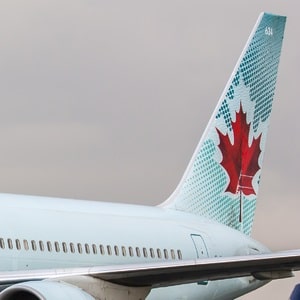Air Canada-Aimia divorce throws Canadian loyalty landscape into turmoil  Another seismic jolt has hit Canada's already-fractured loyalty landscape: Air Canada announced today that it would end its relationship with loyalty provider Aimia, which currently operates the Aeroplan loyalty program on behalf of the carrier, in 2020 and launch its own new proprietary loyalty program. What this means for Aeroplan members, Aimia, and the loyalty landscape in Canada generally remains to be seen. What we do know is that the Canadian loyalty industry will never be the same - and that the coalition loyalty model itself may soon undergo a radical reinvention.By Rick Ferguson Just as recently as last year, Canada could boast that the country was home to the two largest and most successful loyalty providers in the world: LoyaltyOne, which operates the Air Miles coalition, as well as maintaining a significant investment in the Dotz coalition in Brazil; and Aimia, which operates Aeroplan and the Nectar loyalty coalition in the United Kingdom, and which maintains a significant interest in Aeromexico's Club Premiere program. Then LoyaltyOne suffered a well-documented public relations debacle over its miles expiry policy that left the company suffering significant financial damage, its collectors frustrated, and its continued success as Canada's premiere loyalty program in doubt. Now, Aimia suffers its own terrible blow as Air Canada announces the end of its decade-long partnership with the company and the launch of a new loyalty program in 2020. Here are the details, courtesy of the Air Canada press release:
Another seismic jolt has hit Canada's already-fractured loyalty landscape: Air Canada announced today that it would end its relationship with loyalty provider Aimia, which currently operates the Aeroplan loyalty program on behalf of the carrier, in 2020 and launch its own new proprietary loyalty program. What this means for Aeroplan members, Aimia, and the loyalty landscape in Canada generally remains to be seen. What we do know is that the Canadian loyalty industry will never be the same - and that the coalition loyalty model itself may soon undergo a radical reinvention.By Rick Ferguson Just as recently as last year, Canada could boast that the country was home to the two largest and most successful loyalty providers in the world: LoyaltyOne, which operates the Air Miles coalition, as well as maintaining a significant investment in the Dotz coalition in Brazil; and Aimia, which operates Aeroplan and the Nectar loyalty coalition in the United Kingdom, and which maintains a significant interest in Aeromexico's Club Premiere program. Then LoyaltyOne suffered a well-documented public relations debacle over its miles expiry policy that left the company suffering significant financial damage, its collectors frustrated, and its continued success as Canada's premiere loyalty program in doubt. Now, Aimia suffers its own terrible blow as Air Canada announces the end of its decade-long partnership with the company and the launch of a new loyalty program in 2020. Here are the details, courtesy of the Air Canada press release:
- On March 11, Air Canada announced its decision to launch its own loyalty program in 2020 upon the expiry of its commercial agreement with Aeroplan operator Aimia. Effective June 30, 2020, Aeroplan will no longer be the loyalty program for Air Canada.
- Air Canada's exclusive contract with Aimia remains in effect until its June 29, 2020 expiration date. Until then, Air Canada intends business as usual by working closely with Aimia with the objective of providing consistent service for Aeroplan members. During this period, Aeroplan members can continue to earn and redeem miles in accordance with the Aeroplan program.
- Before the new Air Canada program launches in June 2020, members will be able to earn and redeem Aeroplan Miles for Aeroplan Rewards, including flights with Air Canada and our Star Alliance partners in accordance with the Aeroplan program.
- After June 2020, miles earned from Air Canada and Star Alliance flights will be credited to the new program, with customers able to redeem those miles for rewards including Air Canada and Star Alliance partner flights.
- Aeroplan miles earned up to June 2020 will stay in Aeroplan members' accounts, and will continue to be subject to the conditions of their program.
- Air Canada intends to continue to offer Aimia redemption seats for Aeroplan members after June 2020, with pricing competitive with other third-party rewards programs.
- The airline's most frequent flyers will continue to enjoy Air Canada Altitude status recognition and its associated range of travel privileges, based on their annual flight activities with Air Canada and the Star Alliance member airlines. All Million Mile program qualification activity and status will also be honored in the new program.
And here are the requisite money quotes from Air Canada executives. First, Air Canada CEO Calin Rovinescu:
"Our relationship with our more than 45 million customers sits at the core of Air Canada's ongoing transformation as we continue to grow our business beyond the 200 destinations that we already serve, and work to become a global champion. This decision is the right one for our customers, our employees and our shareholders."
Next, Benjamin Smith, Air Canada's President, Passenger Airlines:
"The new program, launching in 2020, will offer additional earning and redemption opportunities, more personalized service and a better digital experience for Air Canada customers. Similar to all of Air Canada's North American peers, by managing our own loyalty program, we will be able to take better care of our customers by making decisions in real time that address specific needs. We're excited to take this next step that delivers on our promise for continued investments in the customer experience."
While we'll never know precisely the factors that led to the breakup, we may surmise that the two primary reasons for Air Canada's departure are cost and control. Certainly the carrier expects to enjoy a financial windfall from operating its own loyalty program; in its press release, the carrier said that it expects the net present value of the program repatriation over a 15-year period to exceed $2 billion. It will also be able to launch new co-branded credit cards through its new program, which could allow the carrier to print money selling miles to its credit card partners. As for control, the carrier certainly intends to own the relationships with its frequent-flyers that currently reside with Aeroplan. The carrier has long been frustrated with messaging and customer service issues that arise from not operating its own mileage program while also operating its own Altitude soft benefits-based program. Owning the entirety of the flyer relationship will potentially allow the airline to leverage data to reward and recognize its best customers in real time without relying on a third-party operator. And whither Aimia? Long guided by Group Chief Executive Rupert Duchesne, the Montreal-based company has been a shining success story in the Canadian business community, rising from its origins as a desperation-move spinoff from Air Canada in 2002, to its rise as a global loyalty company with its acquisition of the Nectar program in 2007 and its acquisition of Carlson Marketing in 2009, to its moment of ultimate triumph in 2014 with the construction of Aimia Tower in the heart of Montreal's financial district. Now, one day after announcing its disappointing first quarter financial results and forewarning investors of the likelihood of Air Canada's departure, the carrier's announcement sent the company's stock price tumbing by more than 50 percent. Its Nectar coalition in the UK is also in turmoil, with billings down due to Sainsbury's reduction in program investment and longtime sponsor Homebase pulling out of the coalition. While Aeroplan maintains its co-branded credit card partnerships with TD, CIBC, and American Express - the company negotiated 10-year agreements with TD and CIBC in 2014 - it's reasonable to speculate that contract language might allow those issuers to renegotiate or even exit the contracts in the event of a change in the company's relationship with Air Canada. So damaging is this recent run of bad news that it casts a shadow over the legacy of Duchesne, who announced his retirement as Group Chief Executive after taking a four-month medical leave of absence earlier this year. The news also leaves incoming GCE David Johnston in the unenviable position of continuing to explore asset sales, or even a sale of the entire company. At this point, the ongoing viability of the company post-2020 remains in question. The good news: Aimia has likely been preparing for this possibility, and now has three years to impliment its post-Air Canada contingency plan. The company certainly can continue to run Aeroplan as a loyalty coalition post-2020. Air Canada will continue to sell seats to the company, albeit at market prices, and it's possible that Aeroplan could reinvent itself as a broad-scale consumer coalition - perhaps even by pinching some of those disgruntled Air Miles partners looking for an exit. The company has strong relati
onships with 5 million affluent Canadians, giving it the opportunity to reinvent those relationships with new partners, new earning opportunities, and new business models. What we do know is that the Canadian loyalty landscape in 2020 will bear little resemblance to its current state. As for the broader implications of this news, here's the question: Will the recent troubles of Air Miles, Nectar, and now Aeroplan throw into doubt the future of the multi-partner loyalty coalition as the predominant loyalty business model? What becomes of the big national coalition programs around the globe? Coalition programs rose to prominance and financial success on their ability to drive profitable consumer behavior at a lower cost while delivering higher member value than expensive proprietary programs. Now lower-cost and more nimble loyalty platforms, as well as cloud-based analytical solutions, make proprietary loyalty plays more affordable, while offering greater control over customer data and relationships, than was possible during the rise of the coalition giants during the last decade. The trend seems to point towards brands wanting more direct control over their customer relationships than coalition programs have historically provided. Coalition loyalty programs certainly continue to offer considerable advantages, including increased earning velocity, the opportunity for cross-partner promotions, and the unique data and consumer insight unavailable to single-brand program operators. We may safely surmise, however, that the news of the Air Canada-Aimia divorce, as well as the Air Miles debacle, will have coalition partners around the globe looking at these partnerships with a more demanding eye. The continued success of loyalty coalitions will require their operators to innovate, and to offer increasing and more compelling value to both consumers and coalition partners. Does the news out of Canada and the UK mark the end of coalition dominance as we know it? Or does the news mark the beginning of a new and more innovative era for coalitions? We certainly hope it's the latter. The success or demise of Aeroplan in the post-Air Canada era will provide an important bellwether for the future of coalition loyalty around the globe. In the meantime, best of luck to both Air Canada and Aimia as they navigate this next phase of their respective businesses. We'll be watching, and rooting for them both. Rick Ferguson is CEO and Editor in Chief of the Wise Marketer Group.




